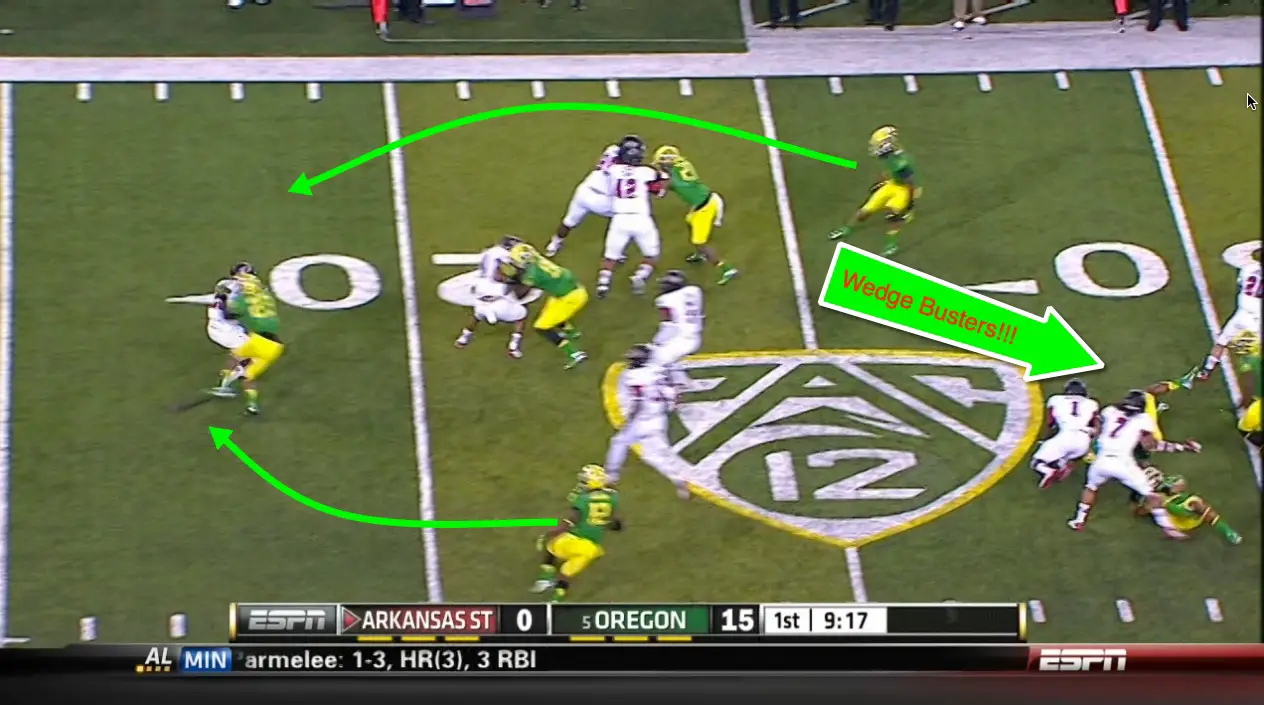Let’s face it – the game we love to watch and learn about starts with a position that we love to hate and hate to love, and that’s the kicker. The kicker is rarely thought of unless the game comes down to the final seconds and he is called on to either be the hero or the goat. My goal in this analysis is to get you to not only look at the kicker in a different light, but the special teams unit all together.
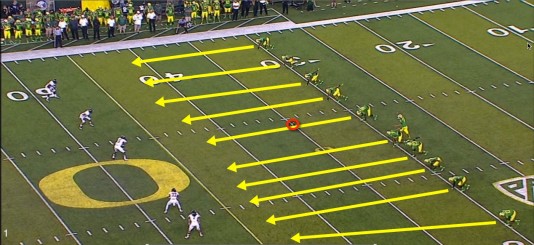
In case you have not noticed, we kick the ball off often. The Oregon special teams have to be disciplined athletes both physically and mentally to run up and down the field on kickoffs as often as we do. If you look at the picture above you can see they take pride in being on the kickoff. The players are in a sprinter’s stance, arms up and ready to fly down the field to make a play. The kick off is more than just kicking the ball and running down the field trying to find the ball carrier. The kick has a direct impact on how successful the coverage can actually be, as discussed below.
Since the game starts with a kick, then it is only fitting that my analysis starts with the kick as well. First and foremost, the majority of fans and coaches would want a touchback every single time the ball is kicked. There is nothing wrong with having a touchback every time because you guarantee the opponent will start on their own 25 yard-line at the start of each possession after a kickoff. Another positive of a touchback is if the other team has a playmaker as a kick returner you are eliminating them from creating explosive plays and taking him out of the game plan.
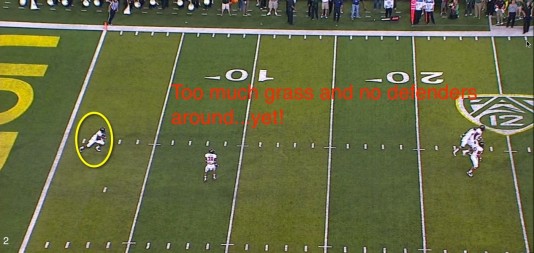
I, however, disagree with the desire for a touchback. I think the kick-off gives the fans a chance to witness the most momentum-changing play in football: a kick-off return for a touchdown or a bone-crushing big hit. If you look at the picture above, the return man for Arkansas State catches the ball at the one yard-line. The returner can’t settle for a touchback and is forced to make a play; this is where other factors come into play. First, the game plan for the week will already have laid out detailed information on who the team plans to avoid kicking to and the strengths and weaknesses of each of the returners. Second, the all-important kick needs to have enough altitude and distance to allow our team to get down the field in time to actually make a play. The kick itself dictates how well we will be able to cover. If the ball is kicked low and directly to the returner, he will have the advantage and cover more grass by the time the cover team arrives, and running lanes will open. The same thing occurs if the kick does not have enough power, as it will be fielded short and give the ball carrier enough time to make a nice return. The altitude of the ball has been our biggest struggle with Oregon special teams over the year because it simply does not allow coverage teams the amount of time needed to get down the field and make the tackle.
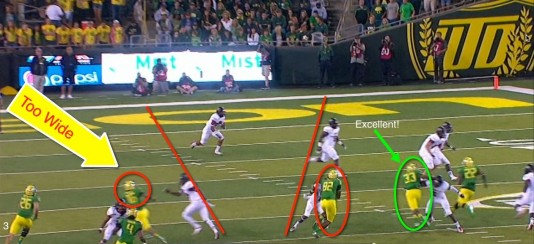
On every kickoff you typically have 10 players attacking the ball carrier and the kicker who typically ends up as the safety. Each player on the kickoff has a specific role. The first rule of their job is to stay in their lane. If a defender gets knocked off of his lane he has to “stack” the blocker and get back into position so no running lanes are created. The picture above demonstrates what “stacking” the defender should and should not look like and how important it can be. Number 33 (circled in green) does an excellent job of beating the blocker and “stacking” or getting right back into his running lane downfield. If the defender goes around the block to the outside and another goes inside (red circles) and neither “stacks” the blocker, nor gets back in their running lane, then they inadvertently create a cutback lane for the ball carrier (red slanted lines).
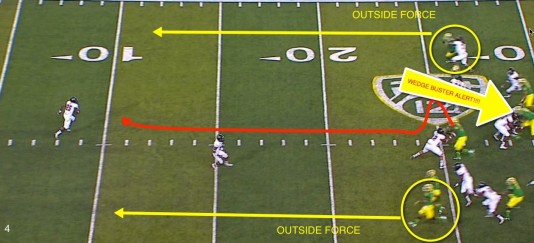
The red arrow in the middle (above) shows the track the defender needs to take to “stack” his defender and stay in his lane. The two players highlighted with the yellow circles are the two contain players who must keep outside leverage and funnel everything back into the meat of our coverage team. They are “force” defenders who force the kickoff return inside. The arrow in the middle is pointing out one of our wedge busters. These players are unselfish and typically first ones down the field. Their sole purpose is to take out the wedge or middle blockers made up of 2 or more players. The purpose of “busting up” these blockers is to free up some of the other defenders to make plays.
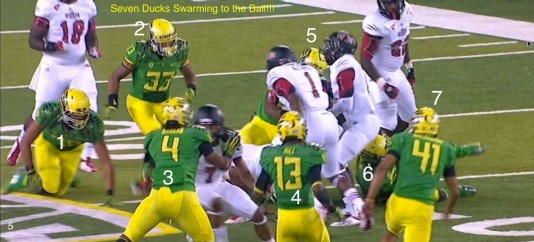
Finally, one thing that was evident throughout every kick-off against Arkansas State was hustle! Every time the ball carrier was tackled we had a plethora of defenders around to help make the play. Not every player may have actually been in on the tackle itself, but there were 6-7 defenders surrounding the ball carrier, forcing him into the mouth of the coverage team. I think this stat goes to show why football, in my opinion, is the greatest team sport there is. Before I finish, leaving everyone with a bad taste about our kicker, please recall my statement earlier regarding how the kickers are typically your safeties on the kick-off. Now, if you look at the picture above you will see number 41 Alejandro Maldonado, right there in the thick of the action. I believe that says a lot about our special teams and Oregon Ducks!
I may be in Texas, but like you…”Oh how we love to learn about our Beloved Ducks!”
Todd Moore
Related Articles:
Todd (Football Analyst) is a former high school defensive coordinator and current administrator in education. He is a football enthusiast of all levels and loves to talk ball to anyone who will listen. He has coached in a spread offense and while coordinating defense used a 4-3 and odd stack. He has coached the offensive line, wide receivers, linebackers and safeties. Todd currently reside in the great state of Texas with his wife and two beautiful daughters.

